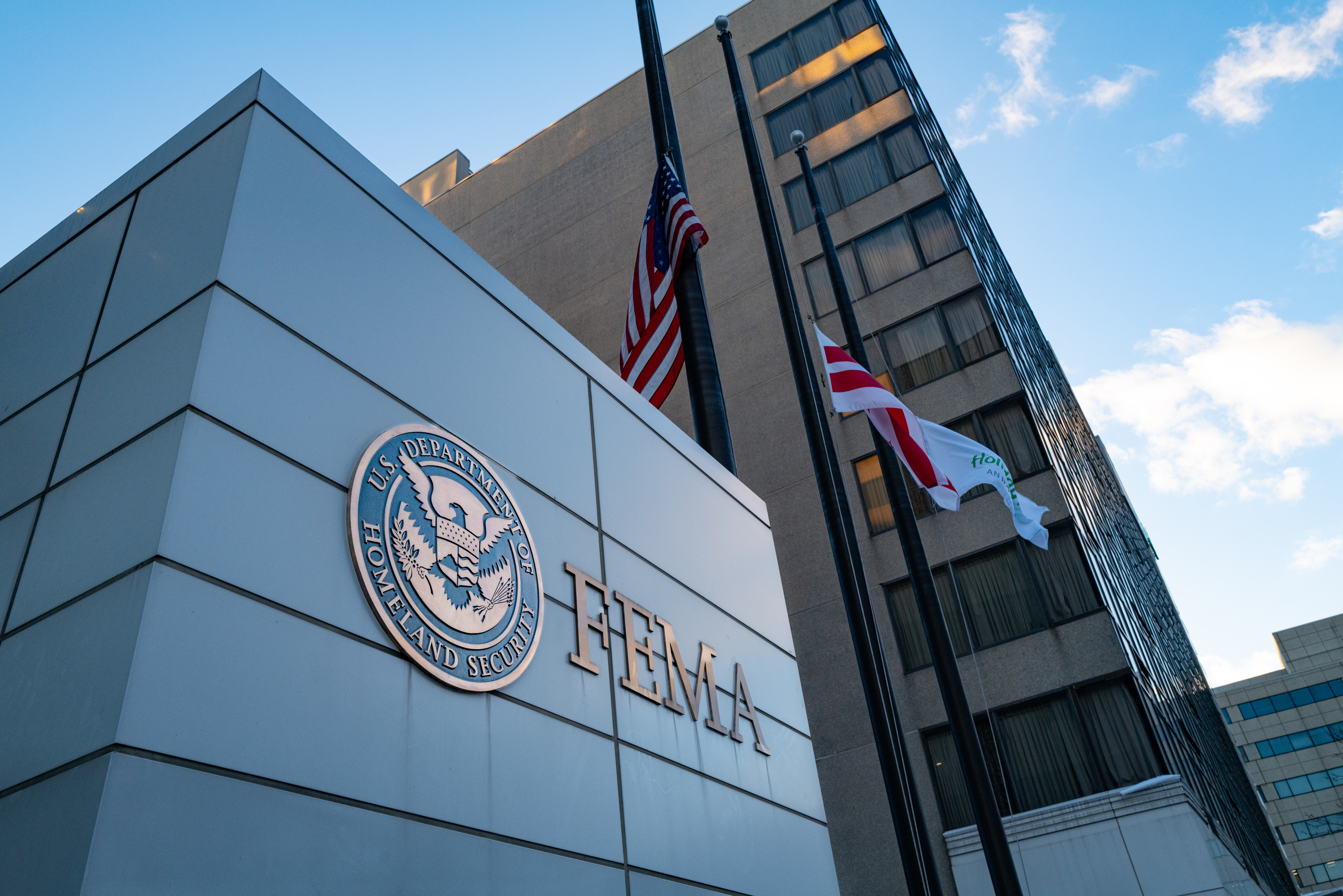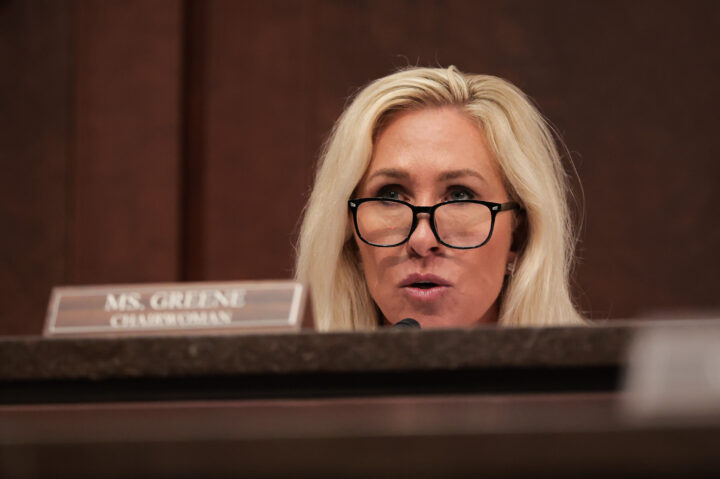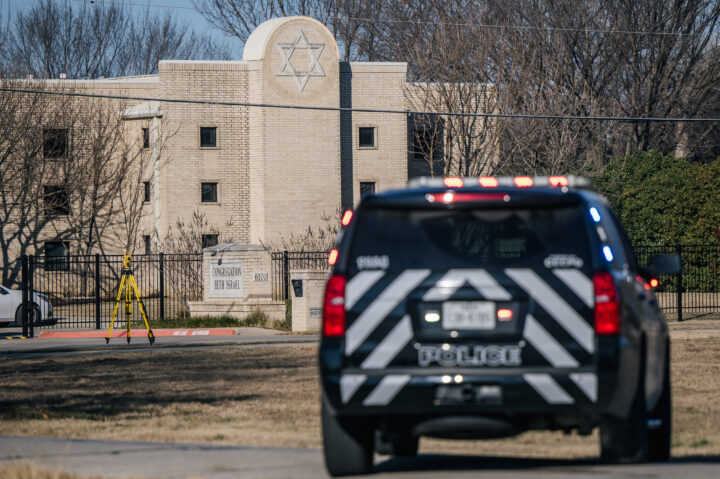A new report from NGO Monitor describes the ‘workaround’ used by international aid groups to continue flow of aid to Gaza despite Hamas involvement

Ali Jadallah/Anadolu via Getty Images
Members of the Al-Qassam Brigades, the military wing of Hamas as the bodies of hostages' are handed over to the Red Cross teams as part of the Hamas-Israel prisoner-hostage swap agreement in Khan Yunis, Gaza on February 20, 2025.
Amid an international outcry over the humanitarian conditions in Gaza, Israel and the Gaza Humanitarian Foundation have repeatedly pointed to Hamas’ practice of diverting and disrupting the distribution of aid that officials say has entered Gaza unimpeded as one of the culprits behind the crisis.
NGO Monitor, which tracks the funding of anti-Israel organizations, wrote a new report given exclusively to Jewish Insider, which claims to show evidence of Hamas controlling the destination of humanitarian aid given in cash for years before and during the Gaza war, including money coming from U.N. agencies and NGOs funded by European governments.
The report alleges that the groups distributed cash and vouchers to beneficiaries selected by the Hamas-run Gaza Ministry of Social Development (MoSD), which since 2019 has been led by Ghazi Hamad, a member of the Hamas politburo who was designated a terrorist by the U.S. last year and who, weeks after Hamas’ Oct. 7, 2023 attacks, vowed that “there will be a second, a third, a fourth … one-millionth” Oct.7-style attack on Israel.
Hamad made headlines in Israel earlier this week with his assertion that the commitments of 11 countries to recognize a Palestinian state is an “achievement” stemming from Hamas’ attacks on Israel.
In 2023, the EU provided $19.6 million, France donated $9.34 million and Spain $1.75 million “for the payment of social allowances to poor Palestinian families.” The EU stated that since 2008, it “has been a steadfast supporter of the Palestinian Authority’s Ministry of Social Development, collaborating to ensure that basic social allowances are extended to the most vulnerable families residing in the West Bank and Gaza.”
In August 2024, according to the report, the EU and Spain provided 15.5 million Euros of aid for Gaza, saying they were partnering with the PA MoSD to deliver it. The EU also gave UNICEF over 4 million Euros in 2023 for a project in which the MoSD was the “main partner.”
Among the governments funding programs involving the MoSD is the U.K., even though its Foreign Office had been made aware of the matter and expressed concern over possible “severe” reputational damage that could come from its involvement.
Other countries funding programs working with the MoSD, according to the NGO Monitor report, include Germany, Switzerland and Norway.
The EU and others say that they are working with the MoSD in Ramallah, controlled by the Palestinian Authority, as opposed to the Gaza MoSD, controlled by Hamas.
However, the NGO Monitor report argues that the Ramallah MoSD was used to circumvent Western countries’ rules against contact with Hamas, a proscribed terrorist organization, while the beneficiaries were still chosen by the Hamas-controlled MoSD in Gaza.
A 2022 Oxfam International analysis of its cash-assistance programs in Gaza described “workarounds needed for the no-contact policy” with Hamas, by way of “the interface between humanitarian agencies and the MoSD in Ramallah, and the local authorities in Gaza,” otherwise known as Hamas.
The Oxfam analysis notes that there is “collaboration between the de-facto government in Gaza and the official Ramallah government,” and that “in the MoSD in Gaza, most of the staff are from the de-facto government,” meaning Hamas.
The organization called for more work with Arab humanitarian aid groups, “capitalizing on the fact that the latter are not restricted by no-contact policies,” meaning that they work directly with Hamas.
Hamas also takes a cut of the cash that aid organizations transfer into Gaza.
The minutes from a Oct. 8, 2024, meeting of the Gaza Cash Working Group, a U.N.-led coordination mechanism for U.N. agencies and international NGOs, state that the Hamas-controlled government in Gaza charged “withdrawal fees up to 20% … these fees are not limited to multipurpose cash assistance, but apply across the entire market.”
NGO Monitor also highlighted a 2022 Mercy Corps Gaza project as an example of Hamas control of humanitarian funding. A description of the project from the U.N. repeatedly referred to the MoSD’s central role.
“Through unconditional cash assistance, this project will identify and select the most vulnerable HHs [households] … from the Ministry of Social Development (MoSD) unserved waiting lists of Social Safety Net (SSN),” the U.N. description states. At another point, it says that the project will be undertaken with “full coordination and engagement with the MoSD.”
Oxfam responded to inquiries from JI that the organization “operates under a strict and clear no-contact policy with de facto authorities in Gaza. We do not work or communicate with the Ministry of Social Development (MoSD) in Gaza. In line with this, our work in Gaza is coordinated through the MoSD’s PA focal point based in Ramallah.”
“The reference in the 2022 study is not an admission of direct engagement,” the organization continued. “It describes sector-wide challenges … We have robust safeguards in place to prevent any misuse or manipulation of our aid programs and adhere to the highest standards of humanitarian principles and accountability.”
Mercy Corps also told JI it has a strict no-contact policy against engaging with sanctioned entities and that allegations that it worked with the MoSD in Gaza is “false and inaccurate.” Their aid recipient lists came from the MoSD in Ramallah, managed by the PA, the organization stated.
“We do not and have not coordinated with Hamas in Gaza to implement our aid programs, and allegations that we work with Hamas are false,” the group stated. “We are confident in our processes and policies, including a rigorous verification process for program participants, which ensures we help the most vulnerable families, while avoiding those with affiliation or contact with sanctioned groups. We have decades of experience delivering humanitarian assistance in high-risk environments like Gaza.”
The BBC reported on Wednesday that Hamas has continued to pay 30,000 salaries throughout the war in Gaza using “a secret cash-based payment system” even as Israel attempts to block the terrorist group from making payments.
Hamas employees receive encrypted messages inviting them to “meet a friend for tea” at a specific time and place. When they arrive, someone hands them an envelope of cash and then walks away.
Hamas has stockpiled about $700m in cash, according to the BBC, but has only paid $7m in salaries since the war began in Oct. 2023. Employees reportedly only receive about 20% of their wages, and the BBC quoted employees claiming to have non-combat roles who were frustrated with the insufficient payments and the dangers in having to travel to collect the cash amid Israeli airstrikes.
In addition, Hamas has reportedly distributed food packages to its members, angering Gazans who accuse the terrorists of not aiding others, according to the BBC.
Sen. Chris Murphy argued that there are no provisions in federal law that give the government any authority to condition funding on the ‘viewpoint diversity’ of the faculty

Jemal Countess/Getty Images for Fair Share America
U.S. Senator Chris Murphy speaks at the rally to Say NO to Tax Breaks for Billionaires & Corporations at Capitol on April 10, 2025 in Washington, DC.
Senate Appropriations committee members sparred on Thursday over the Trump administration’s sweeping moves to combat campus antisemitism, including withholding hundreds of millions of dollars from some elite institutions.
The debate was sparked by an amendment proposed by Sen. Chris Murphy (D-CT) that would prevent the administration from spending any funding on the Office for Civil Rights until the Department of Education inspector general certifies that enforcement actions targeting colleges and universities are being carried out in accordance with law and regulation.
The amendment was voted down along party lines. It’s unclear at this point how much funding the bill — which has not yet been released in full — actually provides for the Office for Civil Rights. The Trump administration had requested substantial cuts to the office’s budget.
Murphy said that the actions taken by the Office for Civil Rights have been undertaken “without going through any of the prescribed processes that we have put in law and previous administrations have put in regulation,” to allow schools and the public to contest and litigate against the decisions before losing federal funding.
“I think the extraordinary ways this administration is ignoring the law or going around the law requires us to do due diligence in making sure that when we appropriate money it gets used for the proper purposes,” Murphy said.
He called the administration’s suspension of funding to Harvard University particularly egregious, specifically highlighting the administration’s demand for greater viewpoint diversity in Harvard’s faculty.
Murphy argued — as he has previously — that there are no provisions in federal law that give the government any authority to condition funding on the “viewpoint diversity” of the faculty.
Sen. Shelley Moore Capito (R-WV), the ranking member of the subcommittee responsible for Department of Education funding, pushed back, describing the administration’s actions as necessary and proper to counter “rampant” antisemitism on campuses and address a lack of action by the prior administration.
“Some of those higher education institutions have come to the table with the administration and said, ‘Yes, we’re gonna make changes, and that’s because of the violations of the office of what is under the Office of Civil Rights Under Title VI,’” Capito said. “Your amendment would halt the work of the Office of Civil Rights.”
Capito warned that any pause in Office for Civil Rights activities would likely drag on significantly.
She compared the situation on college campuses to the Nazi regime in World War II.
Sen. Jon Ossoff (D-GA), who is Jewish, condemned the administration’s actions.
“I utterly reject this administration’s cynical exploitation of this issue, which it uses as a fig leaf to take control of and impose its will on institutions of higher education and other critics,” Ossoff said.
During the committee meeting, Democrats emphasized that the Department of Education funding bill as a whole defied Trump’s wishes to defund and dismantle key parts of the department.
Nonprofits have until Aug. 11 to apply for a grant from the $274.5 million allocated by Congress; FEMA has not announced when it will release additional funds already applied for

Getty Images
Photo of the FEMA building on a winter day.
The Federal Emergency Management Agency opened applications on Monday for 2025 Nonprofit Security Grant Program funding, months after the applications traditionally open and amid pressure from lawmakers and community stakeholders.
Applications for the funding round are due Aug. 11. This application round pertains to the $274.5 million in funding that Congress appropriated for the 2025 grant cycle.
An additional $126 million in funding for the NSGP remains outstanding from the national security supplemental bill Congress passed last year. Organizations have already applied for that funding tranche. FEMA did not respond to a request for comment on when that funding will be allocated.
Delays in opening the application had been a source of frustration among both Jewish groups and the program’s advocates on Capitol Hill. One Senate lawmaker told Jewish Insider last week that they had been pushing the administration to release the remaining security grant funding, calling the delays “dumb.”
A coalition of Jewish groups and other nonprofits also said earlier this month in a letter to Homeland Security Secretary Kristi Noem that the funding would become unavailable on Sept. 30, at the end of the fiscal year, even if applications have not yet been released or evaluated by FEMA.
“The Nonprofit Security Grant Program is a vital resource for faith-based and community institutions facing growing security threats,” Sen. James Lankford (R-OK), who has been pressing the administration to release the funding, told Jewish Insider on Monday. “As Jewish communities have endured a surge in antisemitic threats and violence and now prepare for the High Holidays, this funding could not come at a more critical time.”
“I’ve long been a strong advocate of this program and have worked closely with [the Department of Homeland Security] and [the Office of Management and Budget] to help ensure that this funding moves forward,” he said. “I’m glad to see the application window now open. These grants don’t just strengthen security, they protect lives and ensure that Americans can worship without fear.”
Lankford said last month that the funding had “already been held up too long.”
Lauren Wolman, the senior director of government relations and policy for the Anti-Defamation League, highlighted the need for the outstanding funds from the supplemental bill to be released.
“We appreciate the Administration’s release of $274.5 million in urgently needed Nonprofit Security Grant Program funds, which will help protect at-risk communities facing real threats. But the job isn’t done,” Wolman said in a statement. “FEMA must urgently release the NSGP supplemental funds Congress appropriated to meet overwhelming demand. Every day of delay puts lives at risk.”
Nathan Diament, executive director of public policy for the Orthodox Union, thanked the administration and congressional advocates for their advocacy.
“We [at Orthodox Union Advocacy] are very grateful to our allies in the Trump Administration — especially Amb.-Designate [Yehuda] Kaploun and the White House Faith Office — for working to get this critical funding released,” Diament said. “We also thank our allies in Congress — especially Senators [James] Lankford, [Katie] Britt and [Susan] Collins. At this time of heightened antisemitism the NSGP grants are essential to protect the American Jewish community.”
Eric Fingerhut, the CEO of the Jewish Federations of North America, linked the announcement to JFNA’s advocacy on the issue last month.
“This is an important step for our community’s safety, and it is the direct result of the collective advocacy work that we carried out in June during the United for Security mission and our presentation of the Six-Point Policy on Security Plan,” Fingerhut said. “We should all be proud to see that our work moved the Administration to act.”
Amy Spitalnick, the CEO of the Jewish Council for Public Affairs, who said she had raised the issue at a meeting with House Homeland Security Committee members last week, said that the delays have “cost Jewish and other communities precious time at a dire moment for our security.”
“The funding allocated by Congress through the NGSP has a critical role to play in that process, and we’re glad that after an intensive advocacy push, our communities will finally have the opportunity to apply for these funds,” Spitalnick continued. “We also cannot simply barricade or prosecute our way out of this crisis of violent hate — and measures like this must go hand-in-hand with the broader policies aimed at building resiliency to hate and extremism in the first place.”
The amendment sought to cut $500 million in cooperative missile defense funding

Kayla Bartkowski/Getty Images
Rep. Marjorie Taylor Greene (R-GA) speaks at the U.S. Capitol on May 07, 2025 in Washington, DC.
The House of Representatives on Thursday rejected, in a 422-6 vote, a bid by Rep. Marjorie Taylor Greene (R-GA) to block the $500 million in cooperative missile-defense funding the U.S. provides annually to Israel.
Greene’s amendment sought to strip the funding, provided annually under the terms of the U.S.-Israel memorandum of understanding, from the House’s 2026 Defense funding bill. Rep. Ilhan Omar (D-MN), had introduced a similar amendment.
Greene, Omar and Reps. Al Green (D-TX), Summer Lee (D-PA), Thomas Massie (R-KY) and Rashida Tlaib (D-MI) voted for the aid cutoff.
The House also defeated Greene-led amendments that would have cut military funding for Jordan by a 400-30 vote, for Ukraine by a 353-76 vote and for Taiwan by a 421-6 vote. Only Republicans voted for each of those amendments.
Legislators also rejected, by a 355-76 vote, an amendment by Rep. Greg Steube (R-FL) to cut funding for the Lebanese Armed Forces. All of the votes in favor came from Republicans.
Steube has long opposed funding for the LAF, arguing that it is complicit in Hezbollah’s actions against Israel and infiltrated by Hezbollah members and sympathizers.
Greene argued on the House floor that the Israel funding is “money we don’t have” and that Israel is “very capable of defending themselves.”
Referring repeatedly to the Jewish state as “nuclear-armed Israel,” Greene suggested that Israel’s undeclared nuclear capabilities should deter any threats — even though that has not been the case in the past. Israel has long maintained a policy of nuclear ambiguity, neither confirming nor denying its possession of a nuclear arsenal.
She also highlighted the U.S.’ extensive use of its own ballistic missile interceptors to defend Israel during the recent Iran-Israel war.
Greene noted Israel’s bombing this week of a church in Gaza, for which the Israeli government apologized, calling it a mistake, and said that “an entire population is being wiped out as they continue their aggressive war in Gaza.”
The funding in question supports programs including Iron Dome, Arrow and David’s Sling that are jointly developed by Israel and the United States. The systems, designed to intercept threats like missiles and drones, do not have offensive applications.
Reps. Ken Calvert (R-CA) and Betty McCollum (D-MN), the chair and ranking member of the House Appropriations Committee’s Defense Subcommittee, both spoke on the House floor against Greene’s amendment, as did Rep. Randy Fine (R-FL).
Calvert said that Israel’s success in intercepting ongoing attacks has come partly as a result of the U.S. missile-defense funding provided in past years. He highlighted that the funding supports the U.S.’ defense industrial base, funding production of the systems in both the U.S. and Israel and joint technological development.
McCollum is a vocal longtime critic of Israeli policy toward the Palestinians and the Israeli military operations in Gaza.
“To be clear, I have disagreements with Prime Minister Netanyahu’s government,” McCollum said, describing the war in Gaza as a “tragedy.” “But the funding in this bill does not support offensive weapons for Israel. … This bill provides for defensive measures only.”
McCollum said that everyone in the region deserves safety and that “Israeli children deserve to go to bed at night knowing that missiles from Yemen, Iran or from the Houthis or anywhere else in the region will not rain down on them.”
Fine highlighted that there is a significant American population in Israel under threat from air attacks. He said the co-development of missile-defense programs with Israel helps support America’s own air defense, including President Donald Trump’s Golden Dome proposal for a national air-defense infrastructure.
Addressing Greene’s comments, he noted that America has nuclear weapons, but that hasn’t deterred some adversaries from trying to attack it.
“When we oppose this amendment, when we vote it down, we are not only standing with Israel, we are standing with the best interests of the United States,” Fine said.
He said he’s been working on the issue with top administration officials and acknowledged, ‘It’s already been held up too long’

Andrew Harnik/Getty Images
Sen. James Lankford (R-OK) speaks during a news conference on Capitol Hill on May 1, 2024 in Washington, DC.
Sen. James Lankford (R-OK), one of the leading Senate advocates for the Nonprofit Security Grant Program, told Jewish leaders on Wednesday that he is working with administration officials to ensure that NSGP funding moves forward quickly, but acknowledged that it had already taken too long.
Though the administration recently released freezes on reimbursements for past NSGP grants, it still has yet to announce awards for a supplemental grant round for which nonprofits applied in the fall of 2024, and has not yet opened the application for 2025 grants.
“That funding is not at risk. It is going to be let go, and it should be let go very, very quickly,” Lankford told an advocacy group organized by the Jewish Federations of North American and Conference of Presidents of Major American Jewish Organizations.
He continued, “We do have wide agreement to be able to say this needs to be done. It needs to be done faster, rather than slower. It’s already been held up too long. It’s June, almost July. The decision should have already been made to be able to move this.”
The Oklahoma senator, a co-chair of the Senate antisemitism task force, said he’s been in regular contact with Office of Management and Budget Director Russ Vought — seen as a key fiscal hawk inside the administration — about moving the funding ahead.
“He has assured me again that it is moving,” Lankford said, who spoke to Vought on Wednesday. “They are getting all the details worked out. They continue to be able to work with DHS to be able to make sure that funding is moving. That is not at risk. It is caught up in all the initial – we’re holding everything to be able to look at it. But that funding is not at risk.”
Lankford said he’s continuing to engage with the OMB and other parts of the administration, communicating “this is just common sense, that we need to be able to do this.” The senator urged advocates to keep calling their representatives to continue pushing the issue.
Rep. Virginia Foxx (R-NC), the chair of the House Rules Committee and former chair of the Education and Workforce Committee, also addressed the group, and said she plans to introduce legislation regarding Boycott, Divestment and Sanctions policies on college campuses, which is “going to hold the schools responsible for any BDS activity.”
Rep. Randy Fine (R-FL) warned that he plans to excoriate the president of Georgetown University at a congressional hearing next month if the school hasn’t fired a university professor who urged Iran to attack U.S. forces in retaliation for the U.S. strikes on Iran.
Rep. Haley Stevens (D-MI), who is mounting a bid for Senate, told the group that she’s a “proud Zionist” who “stand[s] with the Jewish community to call out rampant antisemitism, disgusting and egregious antisemitism.”
“My name is Haley Stevens, and you will always have a fierce ally in me,” she said.
She said she’s working to increase funding for the NSGP, noting that an attack like the one in Boulder, Colo., could happen at a synagogue in her district or anywhere in the country.
Other lawmakers who attended the meeting included Reps. Jim Jordan (R-OH), Greg Landsman (D-OH), Lisa McClain (R-MI), Josh Gottheimer (D-NJ), Celeste Maloy (R-UT), Gabe Amo (D-RI), Jake Auchincloss (D-MA), Darrell Issa (R-CA), Brad Sherman (D-CA), George Latimer (D-NY), Shri Thanedar (D-MI), Scott Franklin (R-FL), Joe Morelle (R-NY), Randy Weber (R-TX), Gary Palmer (R-AL) and Lois Frankel (D-FL).
The House’s 2026 Homeland Security Appropriations bill now includes $335 million for the Nonprofit Security Grant Program

Brandon Bell/Getty Images
A law enforcement vehicle sits near the Congregation Beth Israel synagogue on January 16, 2022 in Colleyville, Texas.
The House Appropriations Committee voted on Tuesday to boost its proposal for 2026 Nonprofit Security Grant Program funding by $30 million, up to $335 million, an increase that Jewish groups say is a positive, but insufficient step, amid rising threats to the community.
The change was approved by a voice vote as part of a bipartisan package of amendments.
The committee’s original proposal had set funding for the program at $305 million, the same funding level in place in 2023, which had fulfilled less than half of the grant applications received at the time, before the spike in domestic antisemitism and antisemitic violence in the aftermath of the Oct. 7, 2023, Hamas terror attacks and ensuing war in Gaza.
Supporters of the program on Capitol Hill have, on a bipartisan basis, called for $500 million to be provided for the program in 2026, while many Jewish community groups have said the program should receive $1 billion.
The debate also comes amid rising fears of Iranian-backed or Iran-inspired attacks on Jewish institutions in the U.S. prompted by Israeli and American strikes on Iran.
Eric Fingerhut, the CEO of the Jewish Federations of North America, told Jewish Insider that JFNA is “grateful” for the funding boost, which is “a meaningful step forward, but it’s still not enough.”
“Security isn’t a luxury — it’s a necessity. For many Jewish organizations, the cost of keeping their doors open and our community safe from growing antisemitic threats is the single largest cost,” Fingerhut said.
He noted that JFNA and other Jewish groups are bringing a delegation of more than 400 Jewish leaders to Congress on Wednesday to advocate for greater NSGP funding and other priorities.
Lauren Wolman, director of federal policy and strategy at the Anti-Defamation League, said, “In the wake of surging antisemitic violence and the heightened threat environment following the Iran-Israel conflict, Jewish communities across the country are living in fear.”
“ADL was proud to work with bipartisan members to increase funding for the Nonprofit Security Grant Program in the Homeland Security Appropriations Markup,” Wolman said. “In times of crises, expressions of solidarity are important, but they must be backed by meaningful action. As the appropriations process moves forward, ADL will continue working with members of Congress on both sides of the aisle to increase funding to ensure at-risk communities can worship, learn, and gather without fear.”
“This funding boost over the Subcommittee’s initial proposal is a very welcome and good start,” Nathan Diament, executive director of the Orthodox Union Advocacy Center, said in a statement. “We appreciate the Appropriations Committee’s bipartisan effort to increase funding for the NSGP at such a critical time. With threats against the Jewish community surging, every additional dollar makes a difference in protecting lives.”
But, Diament continued, “the need far exceeds current funding levels, and we will continue to work with allies in Congress toward the $500 million funding target. That level of funding is what our community needs, and it is supported by a strong bipartisan coalition.”
The White House denied Trump’s comments signaled any policy change or the lifting of U.S. sanctions

ATTA KENARE/AFP/GettyImages
Oil tanker SC Hong Kong is seen off the port of Bandar Abbas, southern Iran, on July 2, 2012.
President Donald Trump announced Tuesday that he would allow China to continue to purchase oil from Iran, though a senior White House official denied there had been any change in policy or that sanctions would be lifted.
Trump’s comments appeared to many observers to be a reversal of his own administration’s actions just months ago and in contravention of congressionally approved sanctions designed to cut off the Iran-China oil trade, one of Iran’s most critical sources of funding.
Trump’s comments drove concern among supporters of the sanctions and Iran analysts, who believe that loosening sanctions on Iran now will help it gather funding to rebuild its nuclear program.
“China can now continue to purchase Oil from Iran,” Trump posted on Truth Social on Tuesday morning, following the implementation of a ceasefire between Iran and Israel. “Hopefully they will be purchasing plenty from the U.S., also. It was my Great Honor to make this happen!”
Congress last year passed two separate bills with broad bipartisan support, the SHIP (Stop Harboring Iranian Petroleum) Act and the Iran China Energy Sanctions Act, which were specifically designed to choke off the oil trade between Iran and China. A third bill, the Enhanced Iran Sanctions Act, to place additional sanctions on the trade, has been advancing in the House with strong bipartisan support.
Trump’s announcement appears to mark a striking turnaround from his commitment to “maximum pressure” on Iran. Just months ago, the administration imposed sanctions on Chinese “teapot” refineries for importing Iranian oil for the first time, with the goal of pressuring Iran.
“The President is committed to drive Iran’s illicit oil exports, including to China, to zero,” State Department spokesperson Tammy Bruce said in April. “All sanctions will be fully enforced under the Trump Administration’s maximum pressure campaign on Iran.”
A senior White House official told JI on Tuesday that “The President was simply calling attention to the fact that, because of his decisive actions to obliterate Iran’s nuclear facilities and broker a ceasefire between Israel and Iran, the Strait of Hormuz will not be impacted, which would have been devastating for China.”
The official continued, “The President continues to call on China and all countries to import our state-of-the-art oil rather than import Iranian oil in violation of U.S. sanctions.”
“China is the main consumer of Iranian oil. Enabling China to continue purchasing Iranian oil violates existing sanctions and will allow Iran to rebuild its capabilities, including its nuclear program,” Rep. Josh Gottheimer (D-NJ), the lead Democratic sponsor of the Iran China Energy Sanctions Act, told Jewish Insider.
“With the regime now significantly weakened, we must continue applying maximum pressure and cut off its sources of funding. Doing so will help protect America, our military and diplomatic assets, and our allies around the world.”
Rep. Mike Lawler (R-NY), the lead sponsor of both bills, did not respond to a request for comment.
Trump’s announcement is also driving concern from Iran analysts.
“China purchasing oil from Iran allows it to rearm, refinance and rebuild making future conflict with Israel more likely. It also gives Tehran resources to rebuild its nuclear program,” Jason Brodsky, the policy director for United Against Nuclear Iran, warned. “Also if your goal is zero enrichment in Iran, allowing China to flood Iran with resources makes that goal harder to achieve.”
Brodsky added: “The calculus behind getting China to curtail its purchases of Iranian oil is to achieve zero enrichment in Iran, which has been the president’s longstanding and rightful position.”
“If ever there was a time for more maximum pressure, it would be in a post-strike scenario to contain or roll back the Islamic Republic and prevent China and Russia from helping it ‘build back better,’” Behnam Ben Taleblu, the senior director of the Iran program at the Foundation for Defense of Democracies, said.
Ben Taleblu also noted the sanctions “[undermine] the spirit and letter” of the administration’s executive order and national security memorandum on oil sanctions, while FDD’s CEO Mark Dubowitz highlighted that the trade “violate[s] U.S. sanctions — passed by Congress on a bipartisan basis.”
AIPAC, which urged lawmakers to support the SHIP Act, said in a statement, “We must continue to apply maximum pressure on Iran to ensure that it cannot rebuild its nuclear and ballistic missile capabilities.”
This story was updated at 5:50 p.m. on Tuesday to include comments from a White House spokesperson.
The proposal matches the program’s 2023 funding level, which lawmakers and Jewish advocacy groups called insufficient at the time

Brandon Bell/Getty Images
A law enforcement vehicle sits near the Congregation Beth Israel synagogue on January 16, 2022 in Colleyville, Texas.
The House Appropriations Committee’s draft 2026 Homeland Security funding bill includes $305 million for the Nonprofit Security Grant Program, a marginal increase that would restore the program to its 2023 funding levels.
But lawmakers and Jewish advocacy groups at the time — well before antisemitism skyrocketed following the Oct. 7, 2023, Hamas attacks on Israel, the ensuing war in Gaza and the recent series of antisemitic terrorist attacks in the United States — called that funding level insufficient. At the time, the funding fell well short of meeting demand, which has increased significantly since then.
In 2024 and 2025, the program received $274.5 million, supplemented by $400 million split across the two years from the national security supplemental bill passed in 2024.
In 2023, the program received a total of 5,257 applications, requesting a total of $679 million in funding. Just 42% were approved. Demand increased significantly in 2024 — 7,584 applications were submitted, totaling nearly $1 billion in funding requested. Forty-three percent of applications were approved, with $454.5 million available between annual appropriations and the supplemental.
Bipartisan groups of supporters in the House and Senate have been pushing for $500 million for the program for 2026, while many Jewish groups called for funding to be increased to $1 billion following the shooting of two Israeli Embassy staffers outside a Jewish communal event in Washington in May.
The House’s proposal does, however, deviate from the administration’s request for flat funding — $274.5 million — for the program, indicating some interest from House Republicans in providing additional support for the program.
The House Appropriations Committee’s Homeland Security Subcommittee will meet to debate and vote on the bill Monday evening, and the full committee will debate and vote on it Thursday morning.
Senate Minority Leader Chuck Schumer (D-NY) told Jewish Insider last week that he plans to launch an “all-out push” on Monday for $500 million for the program. He said that Republicans on the Senate Appropriations Committee, who will release their own draft bill, “seemed open to it.”
With both chambers of Congress and the White House controlled by Republicans, Schumer’s voice may have limited impact in the process.
Despite calls from lawmakers and Jewish groups for significant investment, the administration recommended holding funding for the program flat at $274.5 million

MARCO BELLO/AFP via Getty Images
A Miami Beach police patrol drives past Temple Emanu-El synagogue in Miami Beach, Florida, on October 9, 2023, after Hamas launched an attack on Israel.
President Donald Trump’s full budget request to Congress on Friday recommended Congress hold the Nonprofit Security Grant Program at its current level of $274.5 million, in spite of chronic funding shortages and pressure from both lawmakers and the Jewish community for substantially increased funding at a time of rising antisemitism.
In 2024, at that funding level, and with an additional $180 million available from the national security supplemental bill last year, just 43% of funding requests were fulfilled. Supporters of the program in the House and Senate have urged Appropriations Committee leaders and the administration to allocate $500 million for the program, while Jewish groups asked for $1 billion in the wake of the murder of two Israeli Embassy employees at the Capital Jewish Museum.
The budget requests no funding for two hate crimes prevention grant programs, the Khalid Jabara and Heather Heyer NO HATE Act Program and the Matthew Shepard and James Byrd, Jr. Hate Crimes Prevention Grants Program.
The administration indicated in the budget top lines it submitted earlier in May that it aimed to eliminate unspecified Department of Justice hate crimes grant programs, which it said had violated free speech rights.
As previewed in the top lines, Trump recommended a cut in funding to the Office for Civil Rights at the Department of Education, responsible for investigating antisemitism claims, from $140 million to $91 million.
The request also proposes cuts to Federal Bureau of Investigation intelligence and counterterrorism and counterintelligence programs.
The proposal would also significantly cut U.S. military aid to Jordan, cut funding to the State Department by nearly half and ban funding for the United Nations Human Rights Council or United Nations Relief and Works Agency.
The letter was sent the day following the murder of two Israeli Embassy employees, which prompted calls for more resources to protect Jewish institutions

Kevin Carter/Getty Images
U.S. Capitol Building on January 18, 2025 in Washington, DC.
A bipartisan group of 33 senators — mostly Democrats — sent a letter last week urging Senate Appropriations Committee leaders to provide $500 million for the Nonprofit Security Grant Program in 2026, matching the record-high request from a group of House members earlier this month.
The letter was sent the day following the murder of two Israeli Embassy employees outside the Capital Jewish Museum in Washington, an attack that led a coalition of Jewish groups to call for increasing funding for the program, which provides synagogues and nonprofits with grants to improve their security, to $1 billion. The funding request in the Senate letter likely would have been finalized prior to the attack.
It’s not clear, at this point, whether lawmakers might seek to revise their requests to come closer to the $1 billion level, or how feasible either request level might be. The Trump administration had proposed cuts to non-emergency grant programs at the Federal Emergency Management Agency and has not yet offered a specific proposal for the NSGP. The $500 million request is nearly double the NSGP’s current funding level of $274.5 million.
“The threat of violence is unfortunately increasing at places of worship across our country at alarming rates,” the Senate letter reads. “There has been an increase in hoax bomb and active shooter threats against houses of worship to interrupt services and intimidate the worshipers. There has also been an increase in antisemitic and anti-Muslim incidents across the country following the October 7 attack in Israel.”
The letter outlines a series of attacks on houses of worship across the country, including synagogues, which the signatories said “highlight the ever-increasing need for the NSGP.”
The letter also notes the significant shortfall in funding for the program last year, with just 43% of grant applications being approved, even with additional funding available through the national security supplemental bill. Applicants requested a total of nearly $1 billion in funding.
“Unfortunately, it is easy to see that the need for the NSGP is quickly outpacing the funding,” the letter reads, noting that the deficit “left most of the applicants without the funding they needed to provide security to their at-risk institution.”
“Today’s threat environment provides a compelling public interest in preventing attacks that would disrupt the vital health, human, social, cultural, religious, and other humanitarian services provided by at-risk faith-based and nonprofit institutions,” the letter continues. “Such threats terrorize the lives and well-being of millions of Americans who operate, utilize, live, and work in their communities.”
The letter was led by Sens. Kirsten Gillibrand (D-NY), James Lankford (R-OK), Gary Peters (D-MI) and Jacky Rosen (D-NV), joined by Sens. Kevin Cramer (R-ND), Tim Kaine (D-VA), Amy Klobuchar (D-MN), Tammy Baldwin (D-WI), Mark Warner (D-VA), Sheldon Whitehouse (D-RI), Mark Kelly (D-AZ), Adam Schiff (D-CA), John Hickenlooper (D-CO), Angus King (I-ME), Raphael Warnock (D-GA), Alex Padilla (D-CA), Andy Kim (D-NJ), Richard Blumenthal (D-CT), Jack Reed (D-RI), Tammy Duckworth (D-IL), Elissa Slotkin (D-MI), Chris Van Hollen (D-MD), Maria Cantwell (D-WA), Ron Wyden (D-OR), Cory Booker (D-NJ), Angela Alsobrooks (D-MD), Lisa Blunt Rochester (D-DE), Tina Smith (D-MN), Maggie Hassan (D-NH), Jon Ossoff (D-GA), Ben Ray Lujan (D-NM), Dick Durbin (D-IL) and Ed Markey (D-MA).
Though Lankford and Cramer are the only two Republicans who signed the letter, the bipartisan request marks a change in Senate advocacy on this issue — in the past, bipartisan Senate groups have not specified amounts in their lobbying for the program. Senate Democrats last year called for $400 million for the program.
Countries threatening Israel if it does not work with U.N. on humanitarian aid are funding a Hamas-controlled program to distribute aid in Gaza; USAID also involved

OMAR AL-QATTAA/AFP via Getty Images
A Palestinian man stands next to a truck carrying UNICEF aid supplies outside a shopping mall in Gaza City on May 12, 2025.
One of Hamas’ top three sources of funding is the U.K., where it is a banned terrorist organization, an investigation from Israel’s Channel 12 found. That funding includes 25% of Hamas’ donors from non-state actors, as well as tens of millions of dollars from the government of the U.K. to a UNICEF program whose beneficiaries are determined by Hamas.
The U.K., France and Canada threatened Israel last week with “concrete actions” if it does not lift restrictions on humanitarian aid and work with United Nations agencies to distribute it.
The U.K., Canada and the European Union — of which France is a member— as well as Switzerland, Norway, Sweden, Mauritius and Croatia, sponsored a project through UNICEF, the U.N. Children’s Emergency Fund, for which a Hamas-run ministry provides a list of people to receive funding.
The program provides cash payments of $200-$300 per month to 546,000 needy people in Gaza. UNICEF said that it works with a “beneficiary list from the MoSD,” meaning the Hamas-controlled Ministry of Social Development, to determine who receives the cash. The program uses a digital platform funded by USAID to distribute the cash. UNICEF published an update on the program as recently as November 2024.
MoSD is led by Ghazi Hamad, a member of Hamas’ politburo, designated a “senior Hamas official” by the U.S. Treasury Department.
A 2022 document from the U.K. Foreign Office, uncovered by NGO Monitor, showed that London was aware of Hamas’ involvement with the program and that it had the potential for “severe” reputational damage.
“The cash assistance component will be implemented in coordination with the Ministry of Social Development MoSD. The MoSD in Gaza is affiliated with the de facto authorities and thus UK Aid can be linked directly or indirectly with supporting the de facto authority (Hamas) in Gaza which is part of a proscribed group,” the document reads.
The U.K. gave about $23.1 million to UNICEF projects in the West Bank and Gaza in 2024, and $4.8 million in 2023.
NGO Monitor’s legal Advisor, Anne Herzberg, noted that it is unclear how much of that funding went to the Gaza cash program.
“There is very little detail from the U.K. side about how much is going in, what oversight is in place, what exactly they are doing to mitigate the risk” of money going to Hamas, Herzberg told Jewish Insider on Sunday. “A lot of countries are giving funds to the U.N. and just leave it in their hands.”
Herzberg said that while a lot of attention has gone to UNRWA, the U.N. agency for Palestinian refugees and their descendants, which was recently banned from Israel after some of its employees participated in the Oct. 7, 2023, attacks, “UNRWA is just the tip of the iceberg, because 13 U.N. agencies are operating in Gaza. There is very little information into how these other U.N. agencies are operating.”
“Aid diversion is the main problem and why there have been so many issues with humanitarian aid in Gaza,” she said. “It’s inconceivable to me that these governments refuse to deal with this issue. They claim they want to help Palestinians, to end the conflict and bring peace, yet they don’t want to tackle this issue.”
Beyond government aid going to Hamas, what qualifies the U.K. as the leading non-Muslim country funding Hamas is nongovernmental contributions, Channel 12 reported.
In 2001, Muslim Brotherhood-affiliated Sheikh Yusuf Al-Qaradawi founded the Union of Good, a coalition of 50 Islamist charities with connections to Hamas and other proscribed terrorist groups. The group raised hundreds of millions of dollars for Hamas during the Second Intifada.
The organization was banned in the U.S. and U.K., and Qaradawi, who is Egyptian and lives in Doha, Qatar, has been barred from the U.S., U.K. and France.
Yet the organizations making up the Union of Good continued their fundraising activities.
The Channel 12 report names specific Hamas operatives based in the U.K., including Zahar Birawi, who is the head of the Palestinian Return Center in London, leads Hamas activities in Great Britain and has been instrumental in organizing weekly anti-Israel protests in London. Issam Yusef Mustafa, a former member of the Hamas politburo, is a U.K. citizen and is the biggest fundraiser for Hamas in Europe as the head of “Interpal,” a former Union of Good group sanctioned by the U.S. and Israel.
Herzberg explained that many of the organizations funneling money to Hamas are registered as businesses so they can avoid scrutiny from the Charity Commission.
“The monitoring in the U.K. does not seem as robust as what you see in the U.S., where there are many more investigations going on at the governmental level and more reporting, even though the U.K. government says it has robust control in its laws,” Herzberg said. “It’s unclear how those laws are being enforced.”
Erez Noy, a former Shin Bet official dealing with terror funding, told Channel 12 that “Hamas is strong in Britain because over the years they got used to being able to do almost anything they want there, compared to other countries in Europe … For years, Britain, for whatever reason, did not handle preventing and taking care of these systems [to fund terror]. When Hamas realizes there is a permissive arena, it tests the limits.”
Hamas petitioned the U.K. last month to be removed from the country’s list of banned terrorist organizations.
According to Udi Levy, the former head of the Mossad’s department for fighting terrorism funding, “these are businesses that raise funds under the guise of humanitarian aid, and reach Hamas in Gaza, Judea and Samaria [the West Bank] and anywhere else around the world.”
Levy told Channel 12 that “total victory over Hamas is not just in the Gaza Strip. We are making a huge mistake because even if we kill every last ‘soldier’ in Gaza, there is still a massive Hamas infrastructure that will continue to act and even rehabilitate its activities, unless we start taking care of it.”
The British Embassy in Israel said in response to a query from JI that “Hamas is a proscribed terrorist organization in the U.K. and funding or supporting it is a crime. We categorically reject the false and irresponsible allegations in the Channel 12 investigation that the UK Government funds Hamas run agencies in Gaza. No UK funding was provided to the Ministry of Social Development in Gaza … We are clear that Hamas must play no role in the future of Gaza. FCDO [the Foreign Office] conducted a thorough due diligence assessment of UNICEF, and we identify how U.K. funds are transferred until they reach the final beneficiaries.”
The embassy interpreted the claim made by the U.K. Foreign Office that “U.K. Aid can be linked directly or indirectly with supporting the de facto authority (Hamas) in Gaza which is part of a proscribed group,” as referring to the Ministry of Social Development in Ramallah run by the Palestinian Authority.
In addition, the embassy stated that it does “not recognize the claim that 25% of Hamas’s non-state funding comes from the U.K. To our knowledge, no official Israeli body has ever made such a claim.”
Among the requests issued by 42 Jewish organizations is a massive increase in security grant funding to $1 billion

Andrew Harnik/Getty Images
A police officer stands at the site of a fatal shooting at the Capital Jewish Museum on May 22, 2025 in Washington, DC.
A coalition of 46 Jewish organizations issued a joint statement on Thursday urging additional action from the federal government to address antisemitism in the United States following the killing of two Israeli Embassy staffers outside the Capital Jewish Museum in Washington, and particularly expanding funding for a variety of programs to protect the Jewish community.
“The rising level of anti-Jewish incitement, which inevitably leads to violent acts like the one in Washington, DC yesterday, requires governmental action commensurate with the level of danger,” the letter reads.
The demands include a call to massively expand funding for the Nonprofit Security Grant Program to $1 billion, from its current level of $274.5 million, in addition to $200 million in supplemental funding also expected to be released soon. The new request is double the $500 million request from Jewish groups in the immediate aftermath of the Oct. 7, 2023, Hamas attacks and the request recently submitted by a bipartisan coalition of House members.
The letter further said the NSGP process should be “made more flexible and accessible,” describing it currently as “cumbersome and lack[ing] transparency.”
The groups also called for additional funding for security at Jewish institutions, for the FBI to expand its intelligence operations and counter-domestic terrorism operations and for local law enforcement to be empowered to protect Jewish establishments.
“The demands on local and state law enforcement far outpace their capacity to meet the need, which disproportionately affects targeted communities like the American Jewish community,” the letter says, of the need for additional funding for state and local law enforcement.
The groups also urged the federal government to “aggressively prosecute antisemitic hate crimes and extremist violence in accordance with the law” and to hold online platforms including social media and gaming sites “accountable for amplification of antisemitic hate, glorification of terrorism, extremism, disinformation, and incitement.”
The letter describes the murders as “the direct consequence of rising antisemitic incitement in places such as college campuses, city council meetings, and social media that has normalized hate and emboldened those who wish to do harm.”
Signatories to the letter include major national Jewish organizations including the American Jewish Committee, Conference of Presidents of Major American Jewish Organizations, Jewish Federations of North America, Anti-Defamation League and AIPAC, as well as groups representing a wide political and religious cross section of the Jewish community.
The lawmakers said Trump is ‘using what is a real crisis as a pretext to attack people and institutions who do not agree with [him]’
Kevin Dietsch/Getty Images
Senate Minority Leader Charles Schumer (D-NY) leaves a Senate briefing on China on February 15, 2023 in Washington, DC.
A group of Jewish Senate Democrats accused President Donald Trump of weaponizing antisemitism as a pretext to withhold funding from and punish colleges and universities, moves they said in a letter on Thursday “undermine the work of combating antisemitism” and ultimately make Jewish students “less safe.”
“We are extremely troubled and disturbed by your broad and extra-legal attacks against universities and higher education institutions as well as members of their communities, which seem to go far beyond combatting antisemitism, using what is a real crisis as a pretext to attack people and institutions who do not agree with you,” the lawmakers, including Senate Minority Leader Chuck Schumer (D-NY), antisemitism task force co-chair Sen. Jacky Rosen (D-NV) and Sens. Richard Blumenthal (D-CT), Adam Schiff (D-CA) and Brian Schatz (D-HI) wrote to the president.
“It has become abundantly clear that for this administration, the stated goal of fighting antisemitism — which is needed now more than ever, and for which we stand ready to work in a bipartisan way on real solution — is simply a means to an end to attack our nation’s universities and public schools and their ability to function as multifaceted and vital institutions of higher learning and to protect free speech and the civil liberties of their students and employees,” they continued.
The letter points to Trump’s attacks on Harvard University, including the freezing of billions of dollars in funding and threats to revoke its tax-exempt status, as the most prominent examples of the administration’s efforts, which they say “go far beyond constructive and necessary efforts” to support Jewish students.
They said the administration instead appears to be trying to change “the way the university functions” and impose significant penalties “in ways wholly unrelated to combating antisemitism.” The lawmakers instead accused Trump of trying to undermine or destroy these colleges under the “guise” of antisemitism.
“We strongly support efforts to ensure universities uphold their duty to protect students from unlawful discrimination and harassment, but we reject your administration’s policies of defunding and punishing universities out of spite, as they actually undermine the work of combating antisemitism,” the letter continues, “ultimately only making Jews less safe by pitting Jewish safety against other communities and undermining the freedoms and democratic norms that have allowed Jewish communities, and so many others, to thrive in the United States.”
The letter poses a series of questions to the administration, requesting answers by the end of April, including how the administration has chosen the institutions it has targeted, the specific charges made against Harvard, how the “totally disproportionate” penalties are being assessed, how the administration is deciding what funding to cut and what its legal basis is for threatening Harvard’s tax-exempt status.
The lawmakers particularly raised concerns about the impact of cuts to medical research funding, which they say will affect all students, including Jewish students, and why Harvard’s medical school has been targeted.
They also asked why the administration has significantly cut funding and resources for the Department of Education’s Office for Civil rights and how it plans to work with schools to implement reforms and protections for Jewish students going forward, in light of those cuts.
The letter further asks whether the administration has consulted “a broad range” of Jewish students and organizations on remedies for antisemitism and how it will ensure that funding cuts don’t hurt Jewish students or those uninvolved in or victimized by antisemitic activity.
They additionally inquired about the revocation of visas of foreign students and deportation proceedings and whether such actions are being taken based “solely on their expressed views and speech, which the administration has identified as antisemitic.” They asked whether the administration believes that the First Amendment applies to non-citizens and whether any deported or detained students have been charged with any crimes.



































